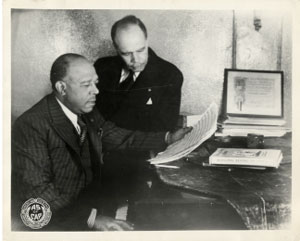Lift Every Voice and Sing
James Weldon Johnson, John Rosamond Johnson, 1900 |

 |
What is the mood of verse 1 of this song, often called the "Negro National Song" (or incorrectly as "National Anthem")? Rejoicing, hopeful. What was the "faith that the dark past has taught us"? Things can get better, hold on no matter how bad, etc. What was "the hope that the present has brought us"? |
 |
What is the mood of the second verse? Grieving, respectful. What does "have not our weary feet come to the place for which our fathers sighed?" mean? What had been achieved by 1900 that earlier generations only dreamed of? |
 |
Had the "victory" been won in 1900? What lines suggest that it had not? Does this song call for immediate change? What lines tell you how fast change should come? "With a steady beat," "treading our path." |
 |
What reforms were African Americans seeking in 1900? Who were the leaders trying to make changes? Booker T. Washington, W. E. B. DuBois, etc. What did each believe was "the victory"? What were their plans for achieving it? Education, voting rights, ending Jim Crow laws, etc. What leaders came later and what were their plans for marching on "till victory is won"? This song's author became the NAACP's CEO in the 1920s. Are you surprised? Why? |
 |
Why has this song endured as the "Negro National Song" and the official song of the NAACP? How well does it speak for today? What other songs might be considered "national songs" to African Americans? Might other Americans also identify with this song? Who and why? Should this song be taught as a patriotic song for everyone? Why or why not? |
|

"Lift Every Voice and Sing" performed by the American Institute Choir on Poets & Patriots: A Tuneful History of "StarSpangled Banner," Star Spangled Music Foundation, © 2014. Available on iTunes, Spotify, and YouTube.
This collection contains a musical history of the "The Star-Spangled Banner" produced by the Star Spangled Music Foundation in collaboration with various scholars of American music. Their website contains a variety of related information not just about the "The Star-Spangled Banner" but about numerous other patriotic songs, including videos you can use in your classroom.
In 1934 James Weldon Johnson wrote:
| |
"I will not allow one prejudiced person or one million or one hundred million to blight my life. I will not let prejudice or any of its attendant humiliations and injustices bear me down to spiritual defeat. My inner life is mine, and I shall defend and maintain its integrity against all the powers of hell."
(Johnson, James Weldon. Negro Americans, What Now? New York: Viking Press, 1934, p. 102.) |
|

View the music and lyrics for "Lift Every Voice and Sing."
|
|

 |
| James Rosamond Johnson and James Weldon Johnson |
James Weldon Johnson (1871–1938) was an African American poet, lawyer, and diplomat. Raised in Florida, he attended Atlanta University and became a lawyer. Throughout difficult times of racist prejudice, Johnson maintained his pride and sense of hope, which is reflected in his poem, "Lift Every Voice and Sing."
Early in 1900, James and his brother John (1873–1954) set this text to hymn-like music for a celebration of Abraham Lincoln’s birthday in Jacksonville, Florida. The song was copied and passed out to schoolchildren where it spread by word of mouth. The song was successful enough to warrant a change of careers for the brothers. John moved to New York in 1901 to perform in a vaudeville act with Bob Cole as "Cole and Johnson." James later joined them. Although they wrote romantic songs and an occasional song in quasi-dialect, they established a reputation as a "class act" and refused to compose stereotypical race songs. While James left New York to join the diplomatic corps in South America, John continued to compose and assembled an anthology, The Book of American Negro Spirituals.
When the song became popular, James suggested that it be recognized as the African American's "national song," not anthem. To avoid conflict, he recommended that it be sung after the "The Star-Spangled Banner." Johnson was CEO of the National Association for the Advancement of Colored People during the 1920s when that organization made "Lift Every Voice and Sing" its official song. |

Compare this song to:
"We'll Understand it Better By and By" (in this unit)
"We Shall Overcome" (Unit 8) |
|


